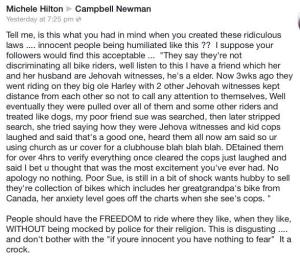Queensland Constitution Act 1867
http://www.legislation.qld.gov.au/LEG…
Requirement for referendum
53 Certain measures to be supported by referendum
(1) A Bill that expressly or impliedly provides for the abolition of
or alteration in the office of Governor or that expressly or
impliedly in any way affects any of the following sections of
this Act namely—
sections 1, 2, 2A, 11A, 11B; and
this section 53
shall not be presented for assent by or in the name of the
Queen unless it has first been approved by the ELECTORS in
accordance with this section and a Bill so assented to
consequent upon its presentation in contravention of this
subsection shall be of no effect as an Act.
( NO STATE REFERENDUM HELD? see Australia Act 1986 below )
The illegal Australia Act 1986
http://www.foundingdocs.gov.au/resour…
Omitting meaning = To fail to include or mention; leave out: omit a word
Australia Act 1986 illegal Amendments to the Constitution Act of Queensland
13. (1) The Constitution Act 1867-1978 of the State of Queensland is in
this section referred to as the Principal Act.
(2) Section 11A of the Principal Act is amended in subsection (3)—
(a) by omitting from paragraph (a)—
(i) “and Signet”; and
(ii) “constituted under Letters Patent under the Great Seal of the
United Kingdom”; and
(b) by omitting from paragraph (b)—
(i) “and Signet”; and
(ii) “whenever and so long as the office of Governor is vacant or
the Governor is incapable of discharging the duties of
administration or has departed from Queensland”.
(3) Section 11B of the Principal Act is amended—
(a) by omitting “Governor to conform to instructions” and substituting
“Definition of Royal Sign Manual”;
(b) by omitting subsection (1); and
(c) by omitting from subsection (2)—
(i) “(2)”;
(ii) “this section and in”; and
(iii) “and the expression ‘Signet’ means the seal commonly used for
the sign manual of the Sovereign or the seal with which
documents are sealed by the Secretary of State in the United
Kingdom on behalf of the Sovereign”.
(4) Section 14 of the Principal Act is amended in subsection (2) by
omitting “, subject to his performing his duty prescribed by section 11B,”.
( NO NATIONAL or STATE REFERENDUM HELD? )
HIGH COURT OF AUSTRALIA ACT 1979
http://www.comlaw.gov.au/ComLaw/Legis…
I………….. , do swear that I will bear true
allegiance to Her Majesty Queen Elizabeth the Second, Her Heirs and Successors
according to law, that I will well and truly serve Her in the Office of Chief
Justice (or Justice) of the High Court of Australia and that I will do right
to all manner of people according to law without fear or favour, affection or
ill-will. So help me God)
Australian Commonwealth Constitution 1900
http://www.foundingdocs.gov.au/resour…
Section 128 Mode of altering the Constitution
This Constitution shall not be altered except in the following
manner:
The proposed law for the alteration thereof must be passed by an
absolute majority of each House of the Parliament, and not less
than two nor more than six months after its passage through both
Houses the proposed law shall be submitted in each State and
Territory to the electors qualified to vote for the election of
members of the House of Representatives.
But if either House passes any such proposed law by an absolute
majority, and the other House rejects or fails to pass it, or passes it
with any amendment to which the first-mentioned House will not
agree, and if after an interval of three months the first-mentioned
House in the same or the next session again passes the proposed
law by an absolute majority with or without any amendment which
has been made or agreed to by the other House, and such other
House rejects or fails to pass it or passes it with any amendment to
which the first-mentioned House will not agree, the
Governor-General may submit the proposed law as last proposed
by the first-mentioned House, and either with or without any
amendments subsequently agreed to by both Houses, to the ELECTORS
in each State and Territory qualified to vote for the election of the
House of Representatives.
When a proposed law is submitted to the electors the vote shall be
taken in such manner as the Parliament prescribes. But until the
qualification of electors of members of the House of
Representatives becomes uniform throughout the Commonwealth,
only one-half the ELECTORS voting for and against the proposed law
shall be counted in any State in which adult suffrage prevails.
And if in a majority of the States a majority of the ELECTORS voting
approve the proposed law, and if a majority of all the ELECTORS.
( NO NATIONAL or STATE REFERENDUM HELD? )


